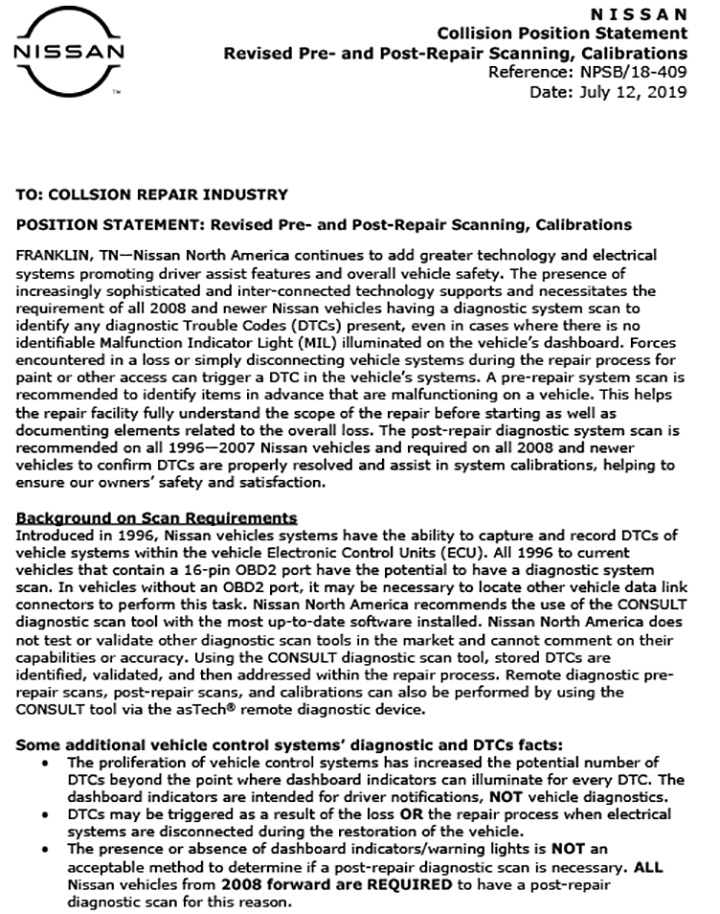ADAS position statements: Why Following Manufacturer Guidelines Matters

Advanced Driver Assistance Systems (ADAS) are increasingly integrated into modern vehicles, providing critical safety and performance features. However, ensuring that these systems function properly after repairs requires strict adherence to ADAS position statements issued by manufacturers. These statements outline essential diagnostic and calibration requirements, which are vital for maintaining the integrity of ADAS technology. Neglecting these guidelines can lead to compromised safety, diminished performance, and liability risks for repair professionals.
Why Are ADAS Position Statements Important?

ADAS systems rely on intricate sensors, cameras, and radar units to function correctly. Repairing or replacing vehicle components without performing required pre- and post-scans can lead to missed diagnostic trouble codes (DTCs). For instance, Nissan’s position statement mandates diagnostic scans for all 2008 and newer vehicles—even if no dashboard warning lights are illuminated. These scans are critical for identifying hidden issues that could compromise ADAS performance.
When repair shops follow ADAS position statements, they ensure compliance with manufacturer requirements, protecting their reputation while delivering safe, reliable repairs to their customers.
The Risks of Ignoring Manufacturer Guidelines
Diagnostic Scans Are Non-Negotiable
Ignoring pre- and post-scans risks missing essential diagnostic trouble codes. These issues might remain undetected until they affect a vehicle’s ADAS functions, such as lane departure warnings or automatic emergency braking.
Liability and Safety Concerns
Failing to adhere to manufacturer guidelines opens repair shops to liability concerns. A poorly calibrated ADAS system could lead to accidents, putting drivers and passengers at risk.
Ensuring Compliance with ADAS Position Statements
Adhering to position statements requires proper training, tools, and equipment. Collision shops must prioritize staying informed on the latest guidelines, such as those available through I-CAR’s RTS portal. Compliance ensures the proper functioning of ADAS systems, protects drivers, and builds customer trust.
By understanding and following ADAS position statements, collision shops can uphold high safety and performance standards, ensuring vehicles leave their care ready for the road ahead.
Related Posts
Southern Utah Passport to Summer 2025
 Car Safety with ADAS Welcome to Premier ADAS Solutions' car safety education for your summer fun. Please view the video...
Car Safety with ADAS Welcome to Premier ADAS Solutions' car safety education for your summer fun. Please view the video...
Front Radar Sensors and Their Role in
 Front Radar Sensors: The Unsung Heroes of ADAS When it comes to modern vehicle safety, one of the most crucial...
Front Radar Sensors: The Unsung Heroes of ADAS When it comes to modern vehicle safety, one of the most crucial...
Blind Spot Monitoring: A Game-Changer for Safer
 Blind spot monitoring and detection transform road safety, providing drivers with an extra set of eyes where visibility is often...
Blind spot monitoring and detection transform road safety, providing drivers with an extra set of eyes where visibility is often...
